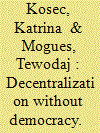|
|
|
Sort Order |
|
|
|
Items / Page
|
|
|
|
|
|
|
| Srl | Item |
| 1 |
ID:
173005


|
|
|
|
|
| Summary/Abstract |
Increasingly, decentralization is being adopted by countries in which assumptions made by formal models of decentralization, such as electoral accountability and population mobility, fail to hold. How does decentralization affect public service delivery in such contexts? The authors exploit the partial rollout of decentralization in the autocratic context of Ethiopia and use a spatial regression discontinuity design to identify its effects. Decentralization improves delivery of productive services, specifically, agricultural services, but has no effect on social services, specifically, drinking water services. This finding is consistent with a model in which local leaders have superior information about the public investments that will deliver the greatest returns and they are incentivized by decentralization to maximize citizens’ production—on which rents depend—rather than citizens’ utility. These findings shed light on nonelectoral mechanisms through which decentralization affects public goods provision and help to explain decentralization’s mixed effects in many nondemocratic settings.
|
|
|
|
|
|
|
|
|
|
|
|
|
|
|
|
| 2 |
ID:
173006


|
|
|
|
|
| Summary/Abstract |
After World War II, the US-led international security order exhibited substantial regional variation. Explaining this variation has been central to the debate over why is there no nato in Asia. But this debate overlooks the emergence of multilateral security arrangements between the United States and Latin American countries during the same critical juncture. These inter-American institutions are puzzling considering the three factors most commonly used to explain divergence between nato and Asia: burden-sharing, external threats, and collective identity. These conditions fail to explain contemporaneous emergence of inter-American security multilateralism. Although the postwar inter-American system has been characterized as the solidification of US dominance, at the time of its framing, Latin American leaders judged the inter-American system as their best bet for maintaining beneficial US involvement in the Western Hemisphere while reinforcing voice opportunities for weaker states and imposing institutional constraints on US unilateralism. Drawing on multinational archival research, the author advances a historical institutionalist account. Shared historical antecedents of regionalism shaped the range of choices for Latin American and US leaders regarding the desirability and nature of new regional institutions while facilitating institutional change through mechanisms of layering and conversion during this critical juncture.
|
|
|
|
|
|
|
|
|
|
|
|
|
|
|
|
| 3 |
ID:
173007


|
|
|
|
|
| Summary/Abstract |
Rising inequality has caused concerns that democratic governments are no longer responding to majority demands, an argument the authors label the subversion of democracy model (sdm). The sdm comes in two forms: one uses public opinion data to show that policies are strongly biased toward the preferences of the rich; the other uses macrolevel data to show that governments aren’t responding to rising inequality. This article critically reassesses the sdm, points to potential biases, and proposes solutions that suggest a different interpretation of the data, which the authors label the representative democracy model (rdm). After testing the sdm against the rdm on public opinion data and on a new data set on fiscal policy, they find that middle-class power has remained remarkably strong over time, even as inequality has risen. The authors conclude that the rich have little influence on redistributive policies, and that the democratic state is apparently not increasingly constrained by global capital.
|
|
|
|
|
|
|
|
|
|
|
|
|
|
|
|
| 4 |
ID:
173008


|
|
|
|
|
| Summary/Abstract |
How does political polarization occur under repressive conditions? Drawing on psychological theories of social identity, the author posits that the nature of repression drives polarization. Repression alters group identities, changing the perceived distance between groups and ultimately shaping the level of affective and preference polarization between them through differentiation processes. The author tests the proposed causal relationship using mixed-method data and analysis.The results of a laboratory experiment reveal that exposure to a targeted repression prime results in greater in-group identification and polarization between groups, whereas exposure to a widespread prime results in decreased levels of these same measurements. The effect of the primes appears to be mediated through group identification. Case-study evidence of polarization between political opposition groups that were differently repressed in Egypt and Tunisia reinforces these results. The findings have implications for understanding how polarization, as conditioned by repression, may alter the likelihood of the cooperative behavior among opposition actors necessary for the success of democratic politics.
|
|
|
|
|
|
|
|
|
|
|
|
|
|
|
|
|
|
|
|
|